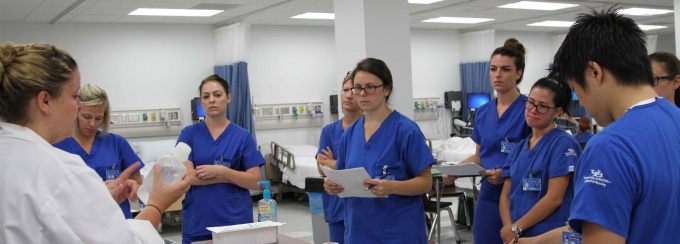A Quick Guide to Conquering Clinicals in Nursing School
BY MAJA ELLERUP, UB MNSA PRESIDENT, UB SON CLASS OF 2018 | DECEMBER 5, 2017

Nursing students have a valuable opportunity to apply the skills they learned in the classroom to real-life scenarios. At the University at Buffalo School of Nursing, students should expect a change in the lecture-style of learning they are familiar with from prerequisite classes. The next two years for traditional nursing students, or one compact year for the ABS nursing students, consist of lecture-style learning and an abundance of group projects, research projects and hands-on experience in a variety of settings, also known as clinical rotations.
Clinical rotations are not just a requirement – it is a privilege to work with skilled professional nurses and to apply what you’ve learned in class to a real-world setting.
What to Expect in Clinical Rotations
Clinical rotations will take place during junior and senior year, with the school’s faculty arranging groups and assignments. You can expect an 8 to 12 hour day working with your clinical instructor or another registered nurse on patient assessments, comfort care, medication administration, inter-professional communication and charting in an electronic health record, all of which will help you gain more independence. In your senior year, there will be opportunities to apply for limited positions in specialty clinical rotations, such as ICU, NICU, Maternal/Newborn, Labor and Delivery, Hospice and Wound Care, among others. These positions are competitive and some require an essay application and additional assignments during the semester.
Be Prepared
Being prepared enables you to take full advantage of your time in clinical. Arrive at your clinical site on time each day prepared to complete your clinical assignment. Be sure to thoroughly complete any required reading, assignments and care plans before you begin each clinical day. Treat clinical as professionally as you would a job – the nurses, managers and clinical professors that you work with may be great contacts for references or job opportunities following graduation. Dress according to your school's dress code and be respectful of the professionals, patients and location of your clinical rotation.
Be an Advocate
As a nursing student and future professional nurse, you will learn to understand the importance of advocating for the needs and safety of your patients; however, it is important to also be your own advocate. You can do so by being prepared to manage the care of your patients and assist with patient care so that you do not lose valuable opportunities to practice your nursing skills. It will take time to build a relationship with your clinical preceptor, but with time will come confidence. Seek out opportunities to learn and do not underestimate yourself; the more experience you gain in clinical, the more prepared you will be in your first job following graduation.